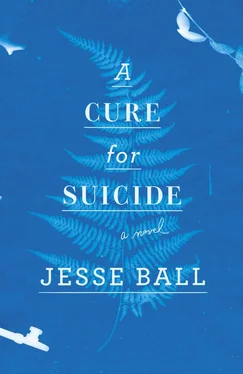The claimant laughed.
— You can’t expect me to believe such a lie. You think you can just tell me anything!
— Oh, I assure you it is true. Never fall into the mistake of believing, said the examiner, that things are everywhere the way they are here, wherever here is, wherever everywhere is.
— THERE IS A THING I want to tell you about, she said. It is called naming. Many things have names. You know that. The bottom post on the staircase is called the newel post. The staircase is called a staircase. The post is called a post. The bottom of the staircase is called the bottom. These are all names. People can have names, too, and naming is a privilege. In human history, names have been used as a form of power. Poor families, for instance, would sometimes have three or four sons, and those sons would simply be given numbers for names. First son, second son, third son. Some people would be named just for their position. Blacksmith, or Miller. In fact, that naming system was so strong that there remain people today who have as part of their names those old positions.
She paused.
— Can you think of someone you speak about in that way?
— The men who work outdoors.
— You call them gardener. And if you spoke to them that way, they would understand. This is why it is useful — because it is effective communication. You speak to them, and they understand. Now, let us imagine that such a person had a different name — a name that had nothing to do with what he or she did. What would you say to that?
— It wouldn’t make sense, he said. How would you get such a name? There would be no reason for you to have it instead of a different name.
— That’s true. What would you call me?
— I would call you, examiner.
— That’s right, and why am I an examiner?
— Because your work is to examine people and things and help to achieve balance.
— That’s what I told you, and I have shown it to be true through my actions. So, to you, a sound name for me is examiner. However, that is not my name. That is the name of my position. In the world, there are many examiners, but there is only one person with my particular allotment of cells who stands in my geographical and temporal position. That person is myself, and so I have a name to help differentiate me from other people who are similar to me.
— But, if you are the only one in your circumstance, why do you need a different name? Shouldn’t your circumstance alone be the name itself? If it is specific to you?
The examiner laughed.
— Very good, very good. But it isn’t necessarily so, because not everyone has perfect information. So, if they saw me on one day at the lake, and then a week later, by that distant field, they might not know that I was the same person, unless I had told them my name. If I had, they could speak to me and use my name, and thereby confirm that it was me.
— But what if there were two of you with the same name?
— That is a problem. It is — and it comes up. In any case, I have a name. That gardener has a name. Everyone has a name. Everyone but you.
— Why don’t I have a name?
— You don’t have a name because you are starting over. You are beginning from the beginning. You are allowed to make mistakes and to fail. You don’t need to do that under a real name, a name that will stay with you. We give you the freedom to make every conceivable mistake and have them all be forgotten. So, for now you will have a conditional name. You will have a name while you are here in this first village. Here your name is Anders.
— Anders. Anders.
He said it quietly to himself.
— Can you say it again?
— Anders, she said.
— Anders. Anders. What shall I call you?
— You can call me Teresa. That is not my real name either. It is the name for the examiner that orbits you. Teresa and Anders. Names always function this way, though people don’t think about it. They only exist in reference to each other.
— I’m not any more Anders to that gardener than I was a moment ago.
— You aren’t. And his name is hidden from you. Perhaps forever.
— Where did my name come from? What does Anders mean?
She thought for a minute.
— I believe it is a Scandinavian name, or perhaps it is German. Let me say completely how it was for me in the moment I named you Anders. That is as close to the meaning of this use of Anders as we can get.
She stood up and went to the window.
— When I was young, there was a girl who lived on the same street as me. Her name was Matilda Colone. She was very pretty and she wore beautiful clothes. She was the envy of everyone at my school, and she was blind. How can that be? Of course, it isn’t silly for grown people with circumspection and wisdom to envy a blind person who happens to be extraordinary. However, for children to do so — when the world is so bright and good to look at…you may imagine that it is surprising.
He nodded.
— She was elegant and calm. She learned her lessons perfectly. She had a seat in the classroom by a window, and the breeze would ruffle her hair or the scarf she wore, and we would all look at her and look at her and look at her. Matilda Colone, we would say under our breath. The teachers adored her, and everyone wanted to be her friend. But, she needed no friends, and would have none. Of all the things she had, and she had many, the best thing was that she had a brother, named Anders, and he sat beside her in class. He walked beside her to school. He brought her her lunch. He held her coat; he held it up, and then she would put it on. He was very smart, smarter than anyone in the class, except perhaps Matilda, but it was hard to say, because they would never cross each other. It was a school for the smartest children in the region. We all loved her so much that we could almost weep.
— What happened to her?
— This was in the old days. Her father shot himself, and she and Anders were separated and put into homes. Some years after that she died of pneumonia.
— Anders, he said to himself.
— Yes, she said. Its meaning is: a brilliant and trustworthy companion who exceeds all expectation.
— But you did not name yourself Matilda.
The examiner smiled. She did a half turn and her dress swirled lightly. To the door she went, and looking back, she said,
— That is a matter of taste. My respect for Matilda and Anders is such that I am not trying to supplant them. I am just invoking them. The tragedy of Matilda’s life is too great for us to speak of it without seriousness. Would I use her name for a purpose? Perhaps I might. Would I name a child Matilda? Certainly. But, it is a name ill suited to a costume. As I plan to retire this name, just as you will retire Anders, it is better to choose a less severe name.
The claimant looked after her in the doorway where she stood. The wooden door frame was worked with pastoral scenes — harvests and crop-sowing and landscapes covered in snow. Beneath it and between it, she seemed almost to kneel, although she stood.
— Teresa, he said. I want to know more about your life.
— It is a part of the help I bring you, she said. One day, you will have heard so much that you tire of it!
EACH NIGHT, the examiner would say to the claimant something like this (not this, but something like it):
Tomorrow we are going to wake up early. I am going to wake early and you are going to wake early. This will happen because I am sure to do so, and I will come and see to it that you are woken up. Then, I shall dress and you shall dress, and we will go downstairs to the kitchen. In the kitchen, we shall have our breakfast and we will enjoy the morning light. We will talk about the furnishings in the room. We will talk about the paintings and the photographs that we talk about each morning. You will have things to say about them and I will listen. I will have things to say to you about the things you have said. In this way, we shall speak. After breakfast, we will wash the dishes we have used and we will put them away. We will stand for a moment in the kitchen, which we will have cleaned, and we will feel a small rise of pleasure at having set things right. It is an enduring satisfaction for our species to make little systems and tend to them.
Читать дальше












